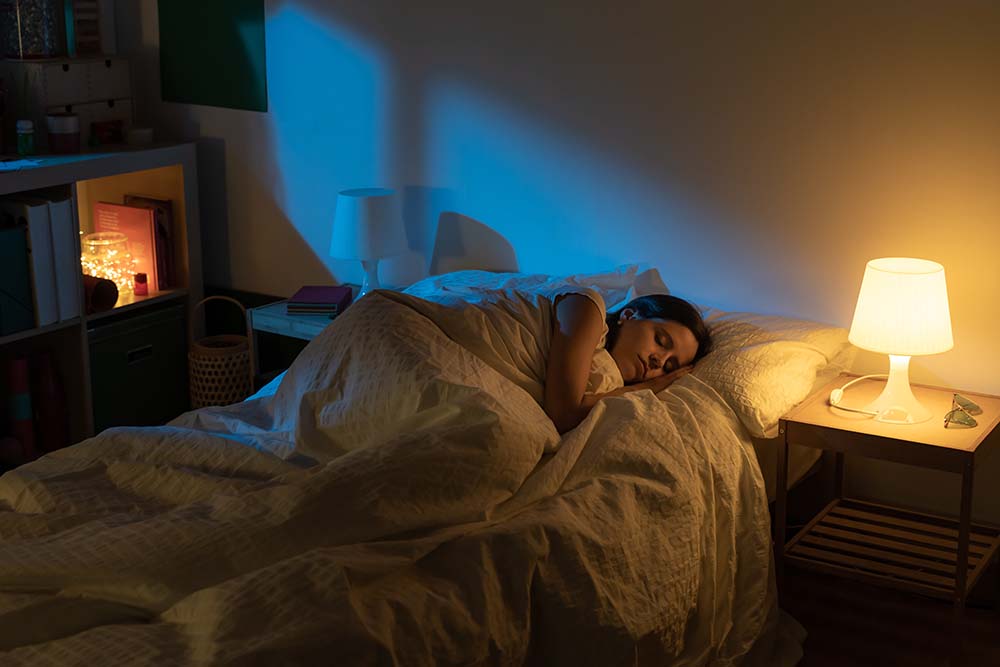Quality sleep stands as an indispensable pillar of overall well-being, transcending its perception as a mere luxury to a fundamental necessity. Its impact extends far beyond the rejuvenation of the body; good sleep intricately shapes cognitive function, emotional equilibrium, and physical health. In the whirlwind of our fast-paced and stress-laden lives, acknowledging the pivotal role of a good night's sleep becomes imperative for sustaining a healthy and joyful existence. It is also important to fix your sleep cycle.
This comprehensive guide is crafted with the mission to delve into the essence of quality sleep and equip you with ten proven tips to unlock its transformative power. Beyond the surface of nightly rest, these strategies aim to tap into the myriad benefits that a well-nurtured sleep routine brings, fostering resilience, clarity of mind and a heightened sense of overall vitality.
How to get good sleep
Tip 1: Establish a Sleep Routine
Establishing a consistent sleep routine emerges as the foundational key to unlocking a realm of restorative and high-quality sleep. It transcends the simplicity of going to bed at a specific time and waking up consistently; it is a commitment to training your body's internal clock. This adherence to a set schedule becomes a synchronising force, allowing your biological rhythms to align with the natural cycles of day and night. As a result, falling asleep and waking up becomes a seamless, innate process, avoiding the jarring disruptions that irregular sleep patterns may induce.
Tip 2: Create a Relaxing Environment
Crafting a serene and tranquil sleep environment is paramount to fostering a night of deep and rejuvenating rest. Your bedroom envisioned as a sanctuary for sleep, should offer a haven of calmness and comfort. By maintaining a cool, dark and quiet atmosphere, you create the optimal conditions for restful slumber. Investing in a comfortable mattress and pillows further elevates physical comfort, providing the necessary support for aching muscles to relax. Eliminating potential distractions, both visual and auditory ensures that your sleep space remains a dedicated area for relaxation. The act of decluttering not only physically organises the space but also contributes to mental decluttering, signalling to your brain that it's time to unwind.
Tip 3: Limit Screen Time
In our technologically driven era, the surge in screen time poses a distinct challenge to achieving quality sleep. The culprit, blue light emitted by digital screens, interferes with our circadian rhythm and suppresses the production of melatonin—the hormone responsible for regulating sleep-wake cycles. Recognising this, one pivotal strategy for enhancing sleep quality is to intentionally limit screen time, particularly in the hour leading up to bedtime. This deliberate reduction in exposure to screens aids in mitigating the disruptive effects of blue light on our internal body clock.

Tip 4: Mindfulness and Relaxation Techniques
Mindfully moderating caffeine and alcohol intake is a strategic approach to cultivating an undisturbed and rejuvenating sleep cycle. Recognising the potential disruptions these substances pose to the delicate balance of sleep patterns, it becomes essential to limit their consumption, especially in the hours leading up to bedtime. Caffeine's stimulating effects can linger, impeding the onset of restful sleep, while alcohol, despite its initial drowsy-inducing impact, can lead to fragmented and less restorative slumber later in the night. Opting for calming alternatives like herbal teas or warm milk not only replaces potential disruptors but also introduces soothing elements, creating a sleep-friendly environment.
Tip 5: Moderate Caffeine and Alcohol Intake
Conscious moderation of caffeine and alcohol intake plays a pivotal role in nurturing a conducive environment for a restful night's sleep. Acknowledging their potential to disrupt the delicate intricacies of the sleep cycle, it becomes imperative to limit their consumption, particularly in the hours preceding bedtime. The stimulating nature of caffeine and the deceptive drowsiness induced by alcohol can significantly impede the natural progression of sleep, leading to fragmented and less restorative slumber. Opting for calming alternatives like herbal teas or warm milk not only substitutes potential disruptors but also introduces elements known for their soothing properties.
Tip 6: Regular Exercise
Regular exercise is a cornerstone for fostering a good night's sleep and promoting overall well-being. Engaging in consistent physical activity, such as moderate exercises like walking or yoga, yields a myriad of health benefits, with improved sleep quality standing out as a notable outcome. The connection between exercise and sleep regulation is profound, as it helps synchronise the body's natural sleep-wake cycle. However, it's crucial to choose activities wisely, favouring moderate exercises over vigorous workouts close to bedtime to avoid any potential disruptions in the winding-down process.
Tip 7: Managing Stress
Stress and anxiety can be major obstacles to a peaceful night's sleep. Develop stress management strategies, such as journaling, deep breathing exercises, or mindfulness meditation, to unwind before bedtime. Prioritising self-care creates a mental and emotional buffer against the demands of daily life, making it easier for your mind to transition into a state of relaxation. By addressing stress, you not only improve your sleep quality but also enhance your overall sense of well-being.
Tip 8: Limit Daytime Naps
Carefully managing daytime napping emerges as a strategic approach to optimising overall sleep quality. While short naps can offer benefits such as enhanced alertness and mood, excessive daytime sleeping poses a potential threat to nighttime rest. The key lies in striking a balance by limiting naps to around 20-30 minutes and avoiding them too close to bedtime. This deliberate approach ensures that your body doesn't enter a state of deep sleep during daytime naps, preserving its readiness for a full night's rest when bedtime arrives. By strategically incorporating these brief and refreshing interludes into your daily routine, you fine-tune your sleep-wake cycle, preventing any interference with the natural progression of nighttime sleep.
Tip 9: Incorporate Natural Light Exposure
Expose yourself to natural light during the day to regulate your circadian rhythm. Spend time outdoors, especially in the morning, to enhance your body's internal clock. This makes it easier to fall asleep at night and wake up feeling refreshed. By aligning your body's natural rhythm with the external environment, you create a harmonious relationship with the day-night cycle, optimising your chances for a more rejuvenating and consistent night's sleep. Overall, incorporating natural light exposure becomes a cornerstone in creating a balanced and consistent sleep pattern, ensuring a more rejuvenating and refreshing night's sleep.

Tip 10: Use White Noise or Relaxing Sounds
Incorporating white noise machines or calming sounds into your sleep routine serves as a simple yet effective strategy for a more peaceful night's rest. The gentle hum of white noise or the soothing melodies of nature sounds create a consistent background that helps drown out disruptive noises, signalling to your brain that it's time to relax and prepare for sleep. This auditory cocoon not only enhances the overall sleep environment but also contributes significantly to an uninterrupted and restful night's sleep. Whether you opt for the rhythmic cadence of white noise or the tranquil sounds of nature, this practice adds a harmonious element to your bedtime routine, promoting a serene atmosphere essential for a rejuvenating night's sleep.
Conclusion
In conclusion, the journey to unlock the power of quality sleep is an essential investment in holistic well-being. By incorporating the ten proven tips into your daily routine, you not only enhance the quantity but elevate the very essence of your sleep. From establishing a consistent sleep schedule to crafting a tranquil sleep haven and embracing mindfulness practices, each step contributes synergistically to a healthier, happier life.
Prioritising these simple yet effective strategies is an act of self-care, a commitment to fostering resilience and vitality. As you embark on this transformative journey, the profound impact of a well-nurtured sleep routine unfolds, bestowing upon you the gift of restful nights and the boundless energy needed to face each day with renewed vigour and joy. Sweet dreams become not just a nightly occurrence but a tangible manifestation of a life prioritised for optimal well-being.
FAQs
How long does it take for a sleep routine to show results?
Consistency is key. While it may take a few weeks for your body to fully adjust to a new sleep routine, you should start noticing improvements within the first week.
Can I catch up on lost sleep over the weekends?
While it's possible to recover some sleep debt, consistent sleep patterns are essential for overall well-being. Aim for seven to nine hours of sleep each night.
Are daytime naps beneficial or harmful?
Short naps can be beneficial for alertness and mood. However, avoid long naps, as they may interfere with nighttime sleep. Establishing a balance is key to optimising the benefits of daytime napping without compromising your nightly rest.